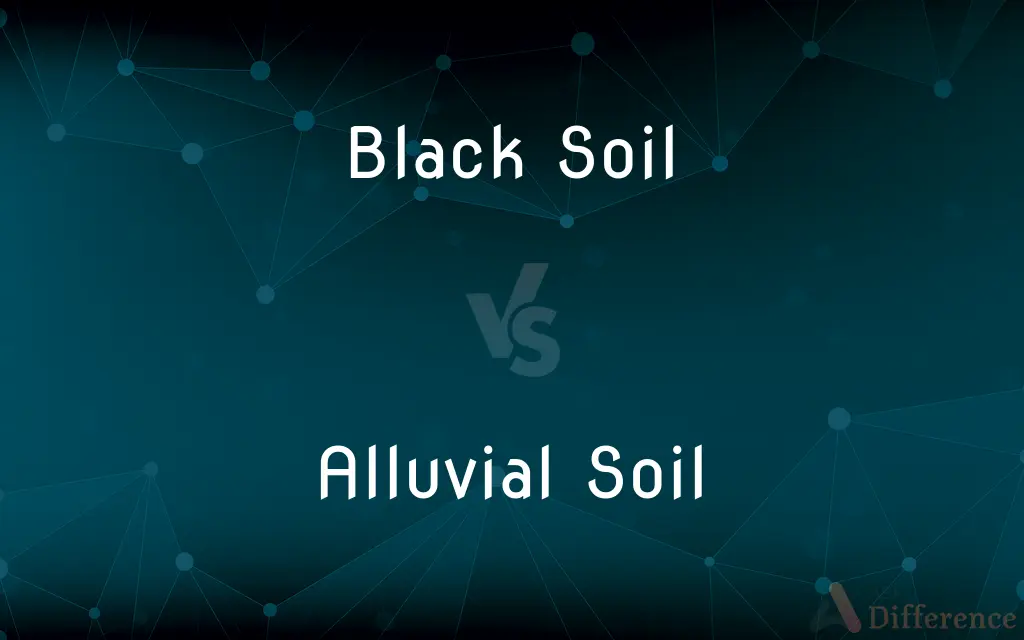Black Soil vs. Alluvial Soil — What's the Difference?
By Tayyaba Rehman — Published on January 28, 2024
Black Soil, rich in iron and moisture-retentive, is ideal for cotton cultivation, while Alluvial Soil, nutrient-rich and well-drained, is suitable for a variety of crops.

Difference Between Black Soil and Alluvial Soil
Table of Contents
ADVERTISEMENT
Key Differences
Black Soil, also known as Regur soil, is characterized by its high iron content and dark color. It is known for its capacity to retain moisture. In contrast, Alluvial Soil, typically found in river basins, is formed from the deposition of silt brought by rivers, making it rich in nutrients and fertile.
The texture of Black Soil varies from clayey to loamy, and it swells and becomes sticky when wet, which can hinder drainage. On the other hand, Alluvial Soil is generally more sandy and loamy, ensuring better drainage and aeration, suitable for a wide range of agricultural activities.
Black Soil is particularly well-suited for growing cotton and is commonly found in the Deccan plateau of India. Conversely, Alluvial Soil, prevalent in the northern plains of India, is highly fertile and supports a variety of crops like wheat, rice, sugarcane, and vegetables.
In terms of cultivation, Black Soil requires less fertilization due to its high nutrient content, particularly phosphates. Alluvial Soil, while fertile, often benefits from regular fertilization to maintain its nutrient-rich quality, supporting intensive agriculture.
The origin of Black Soil is from volcanic rocks and lava flows, contributing to its unique properties. Alluvial Soil, however, is a result of centuries of river water depositing soil from different regions, leading to its diverse mineral content.
ADVERTISEMENT
Comparison Chart
Formation
From volcanic rocks and lava
From river silt deposition
Texture
Clayey to loamy, sticky when wet
Sandy to loamy, well-drained
Best Suited Crops
Cotton, millets
Wheat, rice, sugarcane, vegetables
Drainage
Poor drainage due to swelling
Good drainage and aeration
Nutrient Content
Rich in iron and phosphates
Diverse and nutrient-rich
Compare with Definitions
Black Soil
Ideal for growing crops like cotton and millets.
Farmers prefer black soil for its suitability for cotton cultivation.
Alluvial Soil
A fertile soil type formed by river silt deposits.
The alluvial soil along the riverbank is incredibly productive for farming.
Black Soil
Requires minimal fertilization due to its rich nutrient content.
We use less fertilizer on our black soil farm as it's naturally fertile.
Alluvial Soil
Commonly found in river plains and deltas.
The extensive alluvial soil in the delta region supports diverse agriculture.
Black Soil
A dark-colored soil rich in iron and minerals.
The black soil in our region is perfect for growing cotton.
Alluvial Soil
Suitable for a wide variety of crops due to its nutrient richness.
Our alluvial soil fields yield excellent crops of wheat and rice.
Black Soil
Known for its moisture retention and clayey texture.
Black soil retains water well, making it less reliant on frequent irrigation.
Alluvial Soil
Characterized by good drainage and aeration.
The well-drained alluvial soil is ideal for growing vegetables.
Black Soil
Forms from the weathering of volcanic rocks.
The volcanic origin of black soil gives it unique agricultural properties.
Alluvial Soil
Often replenished with nutrients from flooding rivers.
Frequent floods bring new nutrients to our alluvial soil fields.
Common Curiosities
What makes black soil suitable for cotton cultivation?
Its ability to retain moisture and richness in iron makes it ideal for cotton.
Can alluvial soil be found worldwide?
Yes, it's common in many river basins and deltas globally.
Does black soil require a lot of water?
It retains moisture well, so it doesn't require frequent watering.
How does alluvial soil support diverse crops?
Its nutrient-rich composition and good drainage support various crops.
Is black soil found only in India?
While prominent in India, similar soils are found in other volcanic regions.
Are there any challenges with farming on alluvial soil?
It's generally favorable for farming but can require management in flood-prone areas.
What is the main mineral in black soil?
Iron is a predominant mineral in black soil.
How does the texture of black soil affect farming?
Its clayey nature can make tilling challenging when wet.
Is black soil good for retaining fertilizers?
Yes, its structure helps in holding fertilizers effectively.
Is fertilization necessary for crops in alluvial soil?
Regular fertilization can enhance its natural fertility.
Does alluvial soil have good organic matter content?
Yes, it often contains a good amount of organic matter.
Can alluvial soil be prone to erosion?
Yes, especially in areas with strong river currents.
What type of irrigation is best for alluvial soil?
It adapts well to most irrigation methods, thanks to its drainage properties.
How does the color of black soil benefit it?
The dark color helps in absorbing heat, aiding seed germination.
Do these soil types require different farming techniques?
Yes, farming techniques may vary based on the soil's properties and crop requirements.
Share Your Discovery

Previous Comparison
American Culture vs. Indian Culture
Next Comparison
ISO 9000 vs. ISO 14000Author Spotlight
Written by
Tayyaba RehmanTayyaba Rehman is a distinguished writer, currently serving as a primary contributor to askdifference.com. As a researcher in semantics and etymology, Tayyaba's passion for the complexity of languages and their distinctions has found a perfect home on the platform. Tayyaba delves into the intricacies of language, distinguishing between commonly confused words and phrases, thereby providing clarity for readers worldwide.
















































